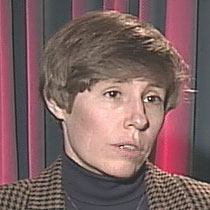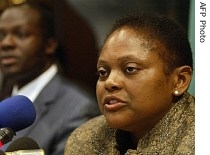2007年VOA标准英语-US Officials Brief Congress on New Military Com(在线收听)
Capitol Hill
01 August 2007
U.S. officials sought to reassure members of Congress Wednesday that the State Department would have a key role in a planned U.S. military command for Africa (AfriCom). They also underscored that the command unit is not being established with combat in mind, as VOA's Deborah Tate reports from Capitol Hill.
State and Defense Department officials told the Senate Foreign Relations Committee that AfriCom will take a long-term, inter-agency approach to improving security, governance and development in Africa. They say the aim is to boost cooperation on anti-terrorism and peacekeeping activities, and programs that promote regional stability.
 |
| Theresa Whelan (file photo) |
"AfriCom's focus is on war-prevention rather than on war-fighting," he said. "We are reorganizing the inner workings of the command to better position it for theater security cooperation activities and preventing problems from becoming crises and preventing crises from becoming catastrophes or conflicts."
Whelan says AfriCom will address security issues in cooperation with African leaders. She says the United States has no intention of basing U.S. troops or military forces on the continent, only staff personnel.
But she did say the new command unit could result in more joint exercises.
"I would anticipate that there would be an increase in the amount of exercises we conduct and other types of military-to-military cooperation activity," he added.
U.S. lawmakers generally approve of plans for AfriCom, although they have questions about its approach.
The top Republican on the Foreign Relations Committee, Senator Richard Lugar of Indiana, says he is concerned the new military command would erode the State Department's role in foreign policy in Africa, particularly since the Pentagon has a larger budget and more personnel.
"The State Department is woefully under funded," he said. "This is the reason we get into these predicaments of who is doing what, because, expediently, the Defense Department has money, it has personnel, and so as a result, this imbalance within our own structure, will be reflected in AfriCom, initially, hopefully not perpetually. But this really does need to be addressed: who does what, who has the money and so who calls the shots, in some instances."
 |
| Jendayi Frazer (file photo) |
"The Department of State will continue to exercise full foreign policy primacy and authority in Africa, and I am confident that no one in the Department of Defense disagrees with this," she said.
Senator Russ Feingold, a Wisconsin Democrat, says he has heard concerns from a number of African countries about the command unit.
"The conversations we have had have indicated a negative response from the African countries on AfriCom," he said.
He did not elaborate. But defense department officials have said that African leaders have expressed concern that AfriCom could lead to a militarization of U.S. foreign policy in Africa.
The officials say that once they explain details of Africom, African nations become more receptive.
Secretary Frazer said the State Department has received "largely positive" reaction from African nations.
Secretary Whelan says Liberia, Botswana, Senegal and Djibouti are among those countries that have expressed support for AfriCom.
Secretary Frazer says no decision has been made yet about the location of AfriCom's headquarters on the continent. She noted Liberia's president, Ellen Johnson Sirleaf, has made public her country's interest in hosting the command unit.
AfriCom is expected to begin operating in a limited way by October, and be fully operational a year later.
The command unit will cover all of Africa except Egypt, which will remain under the responsibility of Central Command, the unit that also handles the rest of the Middle East and Central Asia.